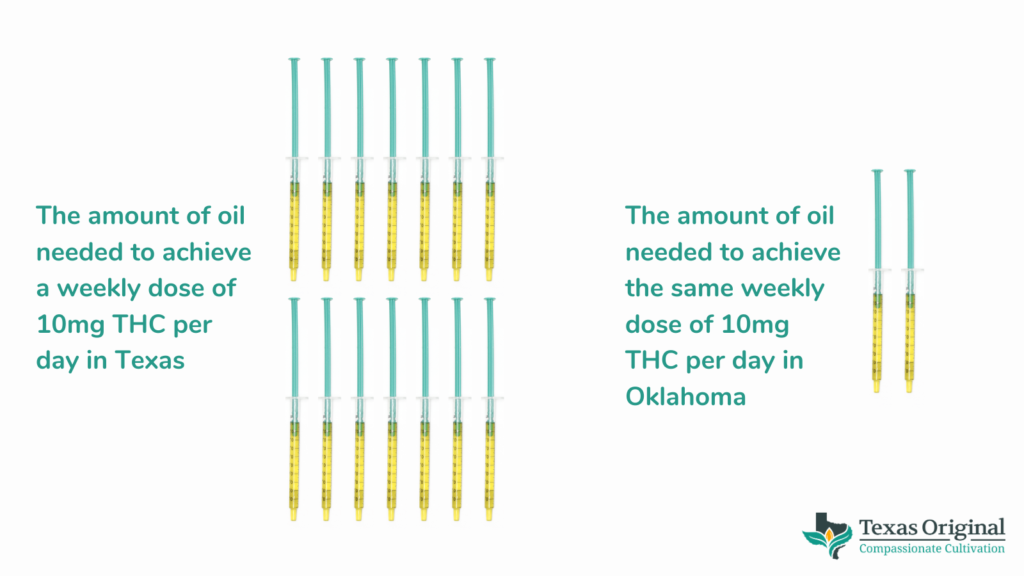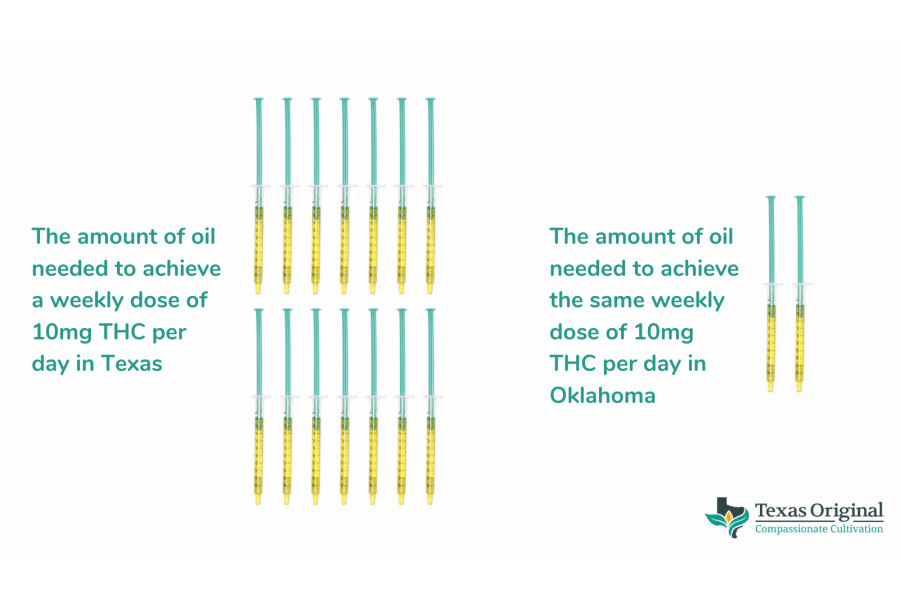In 2015, Texas Governor Greg Abbott signed Senate Bill 339, known as the Texas Compassionate Use Act, authorizing low-THC cannabis as a prescription treatment for intractable epilepsy. Four years later House Bill 3703 passed, expanding the act to include six primary conditions and other incurable neurodegenerative conditions.
The Texas legislature will reconvene in January 2021, kicking off a highly anticipated legislative session for patients and policymakers. Faced with COVID-19 vaccine rollouts, a growing opioid epidemic and a significant budget deficit due to the coronavirus pandemic, Texas legislators have the opportunity to aid millions of Texans—and the state’s economy—through the expansion of Texas’s limited medical marijuana program.
The Texas Original Compassionate Cultivation team will advocate for three main changes to the current Compassionate Use Program (CUP).
Remove Restrictions on Qualifying Conditions
Texas has one of the most restrictive medical cannabis programs in the country, covering only one patient per 10,000 people. Texas’s smaller neighbors—Oklahoma, New Mexico, Arkansas and Louisiana—cover up to nearly 10 times more patients than Texas. Even conditions commonly approved for medical cannabis in other states, such as cancer, are not accessible in Texas unless the cancer is deemed terminal. Other chronic conditions such as fibromyalgia, arthritis, PTSD, insomnia, anxiety and nausea are also not covered in Texas.
We are advocating to put the power to prescribe life-changing medicine back into doctors’ hands, where it should’ve been all along. Doctors, not policymakers, should decide what is best to treat their patients. Removing restrictions on qualifying conditions will grant doctors the ability to prescribe medical marijuana to treat a wide range of symptoms—while also giving more Texans the chance to live healthy, productive lives.

Eliminate the THC Cap
Under Texas law, medical marijuana products may not contain more than 0.5% THC by weight. However, the Compassionate Use Program does not restrict the amount of THC a person can consume. As a result, consuming an adequate dose based on their doctor’s prescription requires some patients to self-administer large, hard-to-digest amounts of carrying oil, which often results in gastrointestinal issues.
For many conditions, THC is critical to helping patients manage debilitating chronic pain, insomnia, nausea or spasms. In lieu of a viable alternative for pain management—such as higher-THC medical marijuana—Texans and their doctors are often forced to leverage harmful, addictive opioids.
Texas is home to four of the top 17 U.S. cities for opioid abuse. Physicians in the state write an average of 47.2 opioid prescriptions for every 100 persons. And while government officials have tried to combat the opioid epidemic in a number of ways, recent data released by the CDC indicates that the COVID-19 pandemic has exacerbated the crisis and has led to a historic spike in overdose deaths. Since 2015, when the Compassionate Use Program was established, almost twice as many Texans have died from opioid overdoses than the total number of patients that have participated in the CUP.
Medical marijuana is a viable alternative to opioids. According to a recent report published by researchers at the University of Arizona, studies noted a significant (64 to 75%) reduction in opioid dosage when supplemented with medical cannabis. Additionally, 32 to 59% of medical cannabis users reported a complete halt in opioid use for chronic, non-cancer-related pain.
Echoing our first agenda point: Doctors, not politicians, should be empowered to prescribe the appropriate doses of THC, CBD or other cannabinoids uninhibited by state law. Without an expanded medical marijuana program, patients will continue to self-medicate through unsafe, unregulated cannabis products, therefore disenfranchising doctors and rendering them unable to provide patients with effective treatment plans.
Enable Medical Marijuana Businesses to Operate Like Other Texas Businesses
The last few years have proven beyond a doubt that Texas can introduce safe and effective medical marijuana legislation. Policymakers have observed the viability of the limited medical marijuana industry in Texas under the Department of Public Safety’s careful regulation.
To effectively serve the patient population—and to meet the needs of future patients—medical marijuana businesses require improvements to several administrative and statutory rules. Granting the ability to store inventory in multiple retail locations will allow our teams to effectively serve our statewide patient base while preparing to serve thousands more.
Expanding the Compassionate Use Program would generate major economic benefits for Texas, while helping to fill the more than $1 billion hole in the state’s budget exacerbated by the COVID-19 pandemic. A full medical marijuana industry requires new construction, real estate and delivery resources, will generate new tax revenue, and would create thousands of jobs and ancillary businesses throughout the state. In Texas, a measured, pro-business approach is estimated to generate more than 44,000 direct and indirect jobs, $1.6 billion in new state tax revenue, and a total economic output of approximately $17 billion over the first five years—all while improving the quality of life for millions of Texans.
Want to Help Change Medical Marijuana Policy in Texas?
The 2021 legislative session is a critical time to advocate for the expansion of the medical marijuana program in Texas. Want to get involved during the legislative session? Here’s how you can help:
- Subscribe to our email list for the latest updates and ways you can help.
- Contact your representative.
- Are you a current patient? Share your story here.
Think you may qualify for medical cannabis in Texas? Click the link below to learn more about current qualifying conditions.




